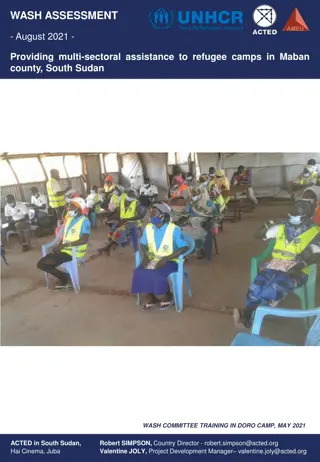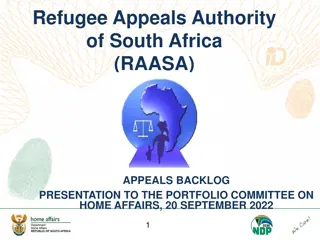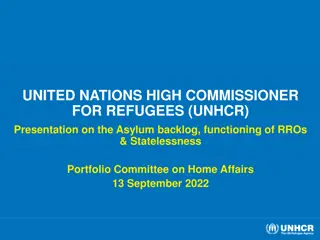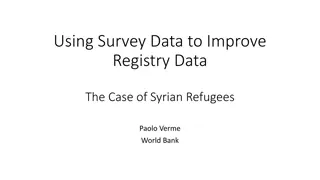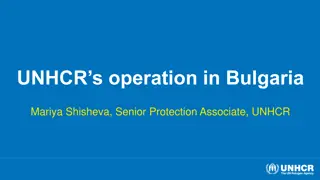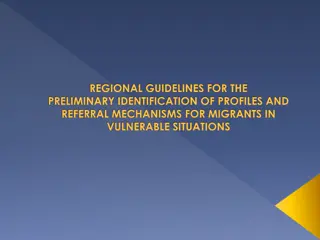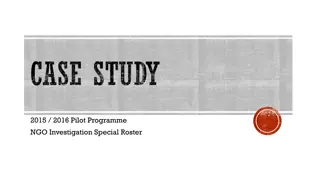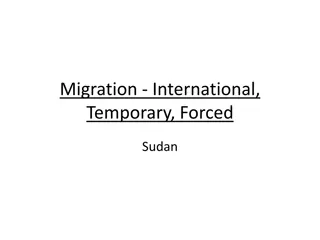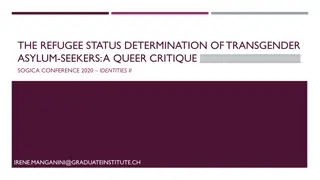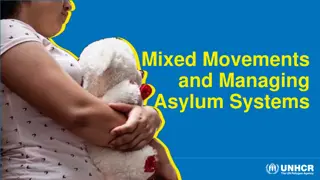Legal Aid to Protect the Right to Legal Identity in Humanitarian Settings
Explore the importance of legal aid in safeguarding legal identity rights for displaced populations through case studies and discussions in humanitarian contexts. Learn about coordination efforts, partnerships with national actors, and good practices in legal documentation programs, such as the UNHC
1 views • 8 slides
Multi-Sectoral Assistance in Maban County Refugee Camps, South Sudan
Providing crucial multi-sectoral assistance to four Sudanese refugee camps in Maban County, South Sudan, with a total refugee population of 171,839. ACTED, in partnership with UNHCR, focuses on water, sanitation, hygiene, and COVID-19 prevention. Objectives include improving water access and quality
1 views • 11 slides
Addressing the Refugee Appeals Backlog in South Africa
The Refugee Appeals Authority of South Africa (RAASA) faces a backlog of appeals due to various reasons, including an influx of asylum seekers in 2009 and challenges with economic migrants. The introduction outlines the establishment and mandate of RAASA, highlighting efforts to address the backlog
0 views • 27 slides
Update on UNHCR's Asylum Appeals Backlog Project in South Africa
The presentation by the UNHCR highlighted the background, successes, and challenges of the Asylum Appeals Backlog Project in South Africa. The project aims to eliminate the existing backlog of 153,000 appeals and prevent new backlogs, with a focus on digitization, research, and efficient decision-ma
0 views • 7 slides
Improving Refugee Targeting: Utilizing Survey Data for Better Assistance Programs
The World Bank and UNHCR collaborate to enhance the effectiveness of assisting Syrian refugees by leveraging survey data to optimize targeting strategies for cash assistance programs. By combining registry and survey information, the study aims to identify the best welfare and poverty indicators, ul
0 views • 18 slides
UNHCR's Operations in Bulgaria and Refugee Protection Mandate
The UNHCR's operations in Bulgaria, led by Mariya Shisheva, focus on providing international protection to refugees, asylum-seekers, stateless persons, returnees, and internally displaced persons. The organization follows the UNHCR Statute and the 1951 Convention on the Status of Refugees to ensure
0 views • 16 slides
Guidelines for Preliminary Identification and Referral Mechanisms for Migrants in Vulnerable Situations
Regional guidelines emphasize the importance of providing protection to migrants in vulnerable situations while respecting their human rights. Technical support from IOM and UNHCR is crucial in identifying and referring vulnerable migrant populations. National workshops have been conducted to enhanc
0 views • 22 slides
NGO Accountability Pilot Programme 2015-2016: Investigation Special Roster
This case study describes the purpose, objectives, and outcomes of a pilot programme aimed at assisting UNHCR partners in investigating misconduct allegations. The programme, managed by Danish Refugee Council, saw limited demand due to factors such as lack of awareness, confidentiality concerns, and
0 views • 4 slides
Understanding Migration from Sudan to Chad: Causes, Consequences, and Refuge
Conflict in Sudan, particularly in Darfur, has led to mass displacement and migration to Chad, with over 300,000 Sudanese refugees still seeking shelter. The causes range from political instability in South Sudan to land rights issues in Darfur. The migration flow includes both forced migrants and t
0 views • 7 slides
Queer Critique of Transgender Asylum-Seeker Refugee Status Determination
Exploring the challenges faced by transgender asylum-seekers in the global asylum system through a queer analysis of the refugee status determination process. Discusses the misinterpretations of UNHCR guidelines related to gender identity, highlighting the marginalization and risks faced by transgen
0 views • 18 slides
Managing Mixed Movements and Asylum Systems
This resource provides a 10-point plan of action for responding to mixed movements, addressing key aspects such as cooperation among partners, data collection, protection-sensitive entry systems, screening and referral mechanisms, solutions for refugees, and more. It offers practical examples and gu
0 views • 6 slides

